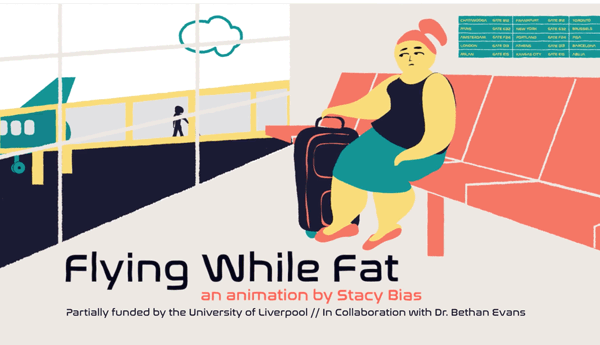On Strong4Life and the Ideology of Health

(To preface, none of this is new info. This is an undergraduate essay and its aim is largely to prove that I understand the concept of ideology and how to apply it to a media example. Also, I quote Puhl here but let it be said that I take issue with a lot of what she says in general. That said, it’s a big EFF YOU to Strong4Life, so I’m posting it.)
Introduction
In mid-2011, the Children’s Healthcare of Atlanta Pediatric Hospital began phase 1 of its five-year, $25 million anti-obesity campaign in Atlanta, Georgia. This campaign aims to curb childhood obesity by engaging in self-proclaimed “harsh” and controversial advertisements via billboards placed all around the city—specifically in lower-income areas that, unsurprisingly, are assumed to have higher instances of obesity. Strong4Life’s billboards[1] are a grim and veritable tableau of fat stereotypes; stark black and white photos featuring dour and unkempt fat children in too-tight, outdated clothing and slapped with bright red WARNING labels beneath which such myth-laden gems as “It’s hard to be a little girl when you’re not” and “Big bones didn’t make me this way, big meals did.”
The resulting controversy is not unexpected. A fierce ideological battle is being waged—online and off, across social media platforms, in magazines, blogs and personal pocketbooks—between a surprising mix of unnatural allies (it’s not often that Fat Activist[2] groups find common ground with the National Institutes of Health (NIH)[3]) and the largely unruffled Status Quo. At the heart of this battle lay the conflicting ideologies of ‘health and good citizenship’ and those who would see an end to fat stigma and the overall problematization of fat bodies.
As the stigmatization of fat people—most specifically children—has real-world impacts on their overall health and well-being, including access to adequate medical care, equal employment opportunities and mental health (Puhl and Latner: 2007), and as, in some fashion, the focus on fat itself as the enemy shifts focus away from deeper systems of oppression, allowing the Status Quo to shift blame for society’s perceived ills on the individual rather than back on itself, this essay will examine the use of ideology in this instance per Thompson’s definition as “meaning in the service of power” (1990: 7).
THE “WAR ON OBESITY”
While the “epidemic of” and subsequent “war on” obesity has been raging for decades, things took a dramatic turn in 1998 when the NIH introduced changes to its BMI scale that would see 25 million additional Americans classified as obese or overweight overnight.[4]
The resultant moral panic (Campos, et al. 2006) has lead to a relentless flurry of media activity, countless governmental and medical initiatives, and an uprise in anti-fat bias, even from within the medical establishment (Puhl, and Brownell 2001).
I propose that the dominant discourses surrounding health as it pertains to obesity are part of a larger symbolic system through which pass the ideological requirements for active and productive citizenship. I also propose that the “problem of obesity” is a tidy package in which class, race and ability-based oppressions intersect and that, in villanizing fat individuals based on the perception of fat as a self-induced state, society avoids the problem of unpacking these oppressions and taking action to alleviate them. Saguy and Almeling have this to say on the subject:
“Are the visibly “obese” – who are also disproportionately poor women of color – the folk devils in the “obesity epidemic,” whose apparent lack of self-control and irresponsibility symbolize many social ills of contemporary society? Discussion of obesity as a “preventable” disease that people bring on themselves through gluttony or sloth or on their children through lax parenting (or, more specifically, mothering) do indeed seem to suggest this reading. According to this line of argument, fat bodies literally embody a rejection of dominant American values of hard work, self-discipline, and the dream of self-actualization.” (2009: 2)
Nowhere has this fear of and repulsion for sloth, greed, lack of intelligence, and irresponsibility been more manifest than in our mad scramblings to ‘save’ our children from the mythical horrors of obesity. And yet, studies have overwhelmingly shown that, in attempting to do so, we are both exacerbating the supposed problem of obesity and contributing to the ill-health of children, fat and thin alike.
To follow Thompson’s argument (1990) that ideological ideas become social realities, a study by Rebecca Puhl and Janet Latner says that “exposure to and internalization of stigma increases cortisol and metabolic abnormalities, which in turn further increases abdominal fat and perpetuates obesity, leading to additional stigma.” (2007: 570) While they note that this hypothesis requires further testing, it is based on an earlier study[5] of racism and stigmatization that held similar findings.
Puhl prefaces this argument by exposing the reality of the stigmatization that fat children face at the hands of peers and adults by citing twelve studies done between 1991 and 2004. These studies show that children are especially prone to the internalization of these prejudices and that, in doing so, risk their social, emotional, and academic development, as well as their overall physical and mental health (2007).
COUNTER-IDEOLOGIES
As referenced earlier, the site of Strong4Life’s battle against childhood obesity is also rich and fertile ground for the passing of counter-ideologies which seek to legitimize fat bodies as something other than merely problems awaiting solution.
In a process of appropriation, a mocking campaign called Stand4Kids was recently launched by Fat Activist, Marilyn Wann[6]. The campaign parodies Strong4Life’s advertisements by stealing their format and replacing the sour-faced children with vibrant, joyful fat people of all sizes, by changing the WARNING to “I Stand4Kids” and adding slogans such as “I stand for joyful activity for all, free from shame” and “I stand for treating all kids with health and respect. Hate does not equal Health.”
In a Gramsci-esque move, a related campaign[7] successfully raised $21k in under a week to fund a billboard in Georgia which will challenge the ideologies represented by Strong4Life’s campaign.
CONCLUSION
In the service of power rather than children, in preservation of the Status Quo, in protection of the thin veil across the many intersecting oppressions that would require more effort, more funding and more accountability to resolve than it has ever been the predilection of dominant society to offer, Strong4Life’s ad campaign harnesses fear and uses naturalized myth and blatant shaming tactics to reinforce dominant ideologies of health and productive citizenship.
And yet, as Gramsci suggests (as referenced in Harman 2007), and as the Stand4Kids organizers can attest to, ideology is not fixed, power is not absolute, and battles are waged constantly to shift balances of power, public opinion and perceptions of self. I know which side I’m rooting for.
[1] http://www.about-face.org/wordpress/wp-content/uploads/2012/02/strong4life.jpg
[2] http://en.wikipedia.org/wiki/Fat_acceptance_movement
[3] http://fiercefatties.files.wordpress.com/2012/02/nichd-letter.pdf
[4] http://edition.cnn.com/HEALTH/9806/17/weight.guidelines/
[5] Butler, Tull, Chambers, & Taylor, 2002 – not cited.
[6] http://www.fatso.com
[7] http://www.gofundme.com/dp16w
REFERENCES
Campos, Paul, et al . “The epidemiology of overweight and obesity: public health crisis or moral panic?.” International Journal of Epidemiology. 2006.33 55-60. Web. 15 Feb. 2012. <http://ije.oxfordjournals.org/content/35/1/55.full.pdf html>.
Harman, Chris. “Gramsci, the Prison Notebooks and philosophy.” International Socialism. 2007.114 n. page. Web. 15 Feb. 2012. <http://www.isj.org.uk/index.php4?id=308&issue=114Gramsci,>.
Puhl, Rebecca, and Kelly Brownell. “Bias, Discrimination, and Obesity.” Obesity Research. 2001.9 788–805. Web. 15 Feb. 2012. <http://www.nature.com/oby/journal/v9/n12/pdf/oby2001108a.pdf>.
Puhl, Rebecca, and Janet Latner. “Stigma, Obesity, and the Health of the Nation’s Children.” Psychological Bulletin. 133.4 (2007): 557–580 . Web. 15 Feb. 2012. <http://www.nichq.org/pdf/PsychBUL Rebecca Puhl.pdf>.
Saguy, Abigail. and Almeling, Rene. “Fat Panic! The “Obesity Epidemic” as Moral Panic” Paper presented at the annual meeting of the American Sociological Association, Marriott Hotel, Loews Philadelphia Hotel, Philadelphia, PA, Aug 12, 2005 2009-05-25 <http://www.allacademic.com/meta/p22928_index.html>





February 15, 2012 at 10:01 am
Big Liberty
I’ve seen a lot of the “I Stand” posters (which are great) but your is by far the greatest. Sociological argument for the win!
February 15, 2012 at 10:27 am
Stacy Bias
Hey, thanks! It was really fun to come up with! I did a sweeter one with my mom as well, but this seemed most appropriate for this post. ;)